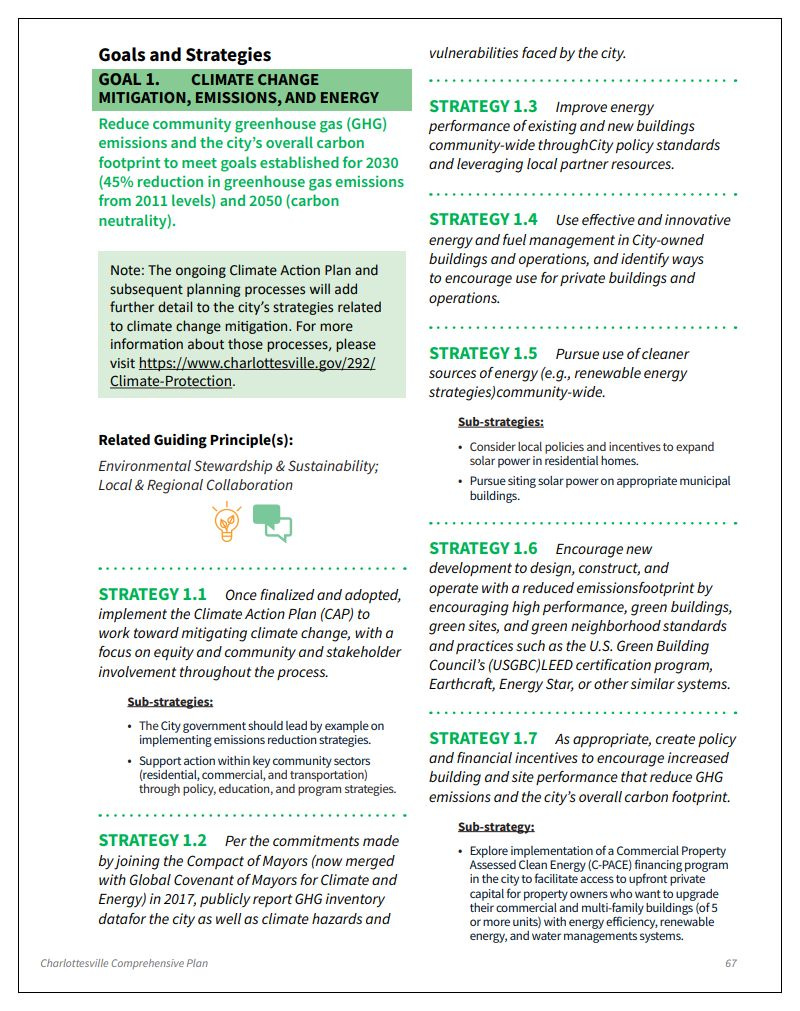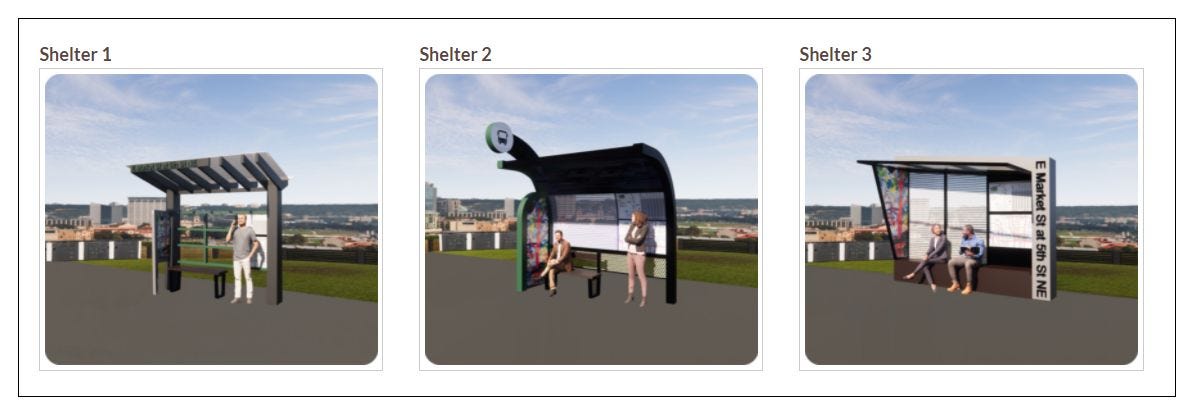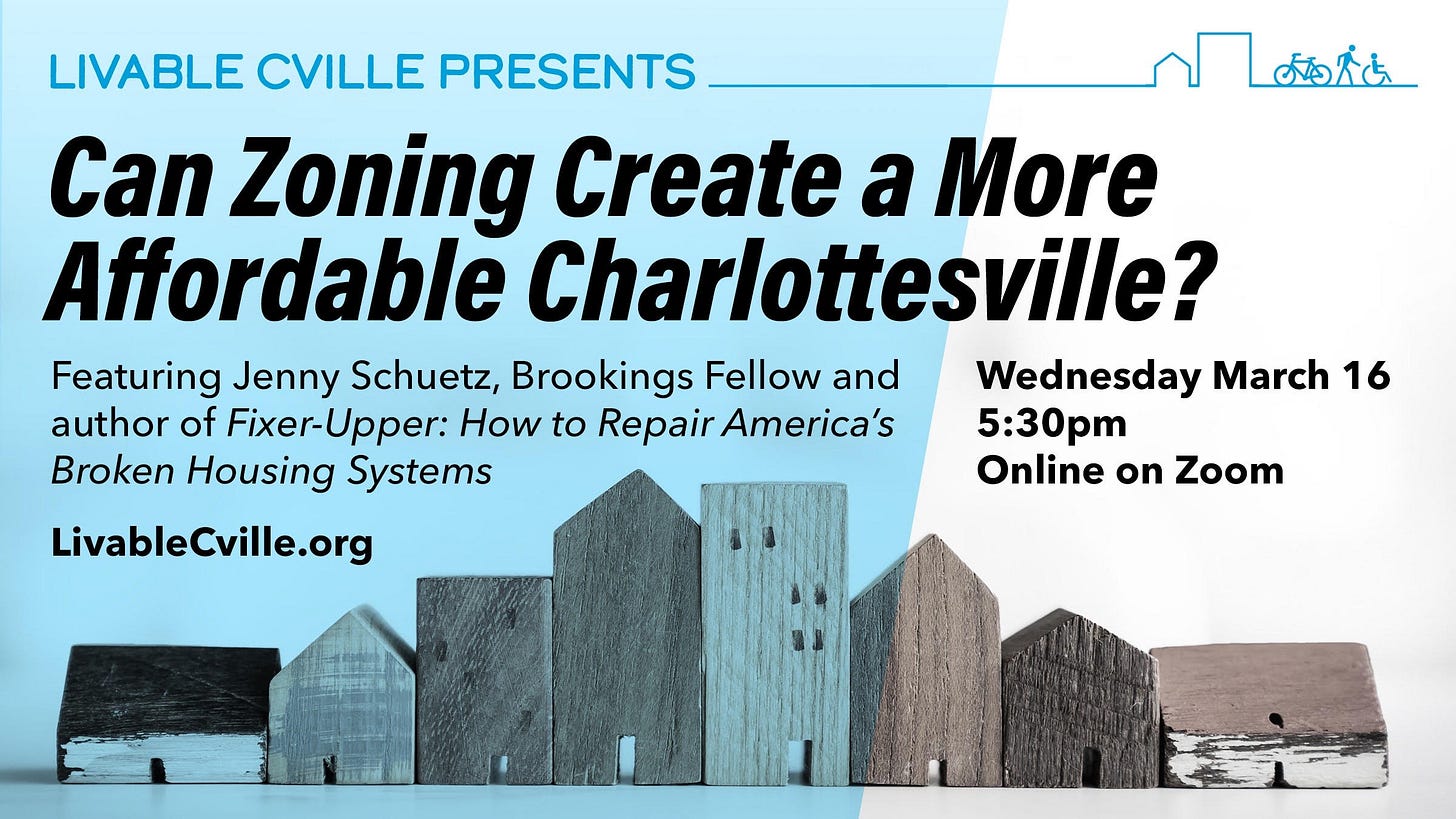March Eleven. 3/11? 3-1-1? In some places you can dial that number to get information, a valuable commodity in a complex world. On this 70th day of 2022 and in this installment of Charlottesville Community Engagement, you can find out a lot of odds and ends about what’s happening. How many of each? Stick around and find out. I’m your host, Sean Tubbs.
On today’s program:
Charlottesville City Council will get an update on efforts to create a long awaited climate action plan to reduce greenhouse gas emissions
The city will use funding from a carbon cap and trade program to prepare for future flooding
Charlottesville Area Transit wants your input on the next generation of bus shelters
Charlottesville is close to hiring a new communications director, and is seeking college students to apply for internships
A brief update on the pandemic
First shout-out if for CBIC’s C-E2 event
In today’s first subscriber-supported shout-out, the Charlottesville Business Innovation Council wants you to know that after two years, they’re holding their Charlottesville Entrepreneurs and Espresso event in-person on the morning of Tuesday, March 15 at the CODE Building? What is Charlottesville Entrepreneurs and Espresso, or C-E2? It’s a casual, caffeine-fueled gathering of learning at all stages of venture creation. Get inspired, meet fellow entrepreneurs, share lessons learned, and become a part of Charlottesville’s vibrant and growing entrepreneurial ecosystem. Visit cvilleinnovation.org to learn more about this free event or sign up on Eventbrite.
Pandemic turns 2
Tomorrow marks the two-year anniversary of the declaration of emergency for the COVID-19 pandemic in Virginia. The seven-day percent average for new COVID tests is at 4.7 percent, around a level not seen since late last July when the Delta variant caused a surge that has not quite receded until now. Still, the Virginia Department of Health marks another 1,272 new cases today.
The agency has also made changes to its COVID dashboard and no longer is listing case counts by locality. That data, as well as deaths reported by date, will continue to be available on Virginia’s open data portal.
The Blue Ridge Health District does report local case data and there are 48 new cases today and the percent positivity is at 4.5 percent.
The Centers for Disease Control now list Albemarle, Charlottesville and the other Blue Ridge Health District localities as medium. (review the map)
“We were anticipating that we would be dropping to a medium level when we were looking at the numbers earlier this week so those were born out yesterday when the CDC updated their calculations,” said Dr. Costi Sifri, the director of hospital epidemiology at the University of Virginia Health System.
Dr. Sifri said he would recommend that those with underlying conditions or who are immunocompromised to remain masked indoors and to make sure their mask offers enough protection.
Dr. Sifri said there is a lot of immunity in the community through both vaccination and infections, but he said there is still opportunity for another variant to happen in the future. When will be determined on a number of variables.
“And I think clearly for a lot of people after two years of living through this pandemic, they are at a point where they’ve been vaccinated, they’ve taken precautions, but have now sort of have come to a point where its an understanding there will be some level of circulation likely going forward for the foreseeable future and we could anticipate this may become another seasonal virus,” Dr. Sifri said.
As we hit the two-year mark, there have been 19,212 COVID deaths in Virginia, and 431 in the Blue Ridge Health District.
It’s been two years since I launched a podcast to cover the response. Go back and listen if you’d like to revisit any of that recent past. (Charlottesville Quarantine Report)

Charlottesville sets April 18 work session for work session on climate action
Nearly all functions of government in most Virginia localities can be derived from their Comprehensive Plan, which lays out broad steps to turn a community’s vision into action.
The new Comprehensive Plan adopted by Council in November calls upon the city to create a specific plan to demonstrate how Charlottesville will meet specific reductions in greenhouse gas emissions.
The nonprofit Community Climate Collaborative wants City Council to spend more money to get a plan in place as soon as possible. Executive Director Susan Kruse posted a blog entry on March 3 saying Charlottesville has fallen behind on efforts. She read from this post at Council’s meeting this past Monday.
“This July will mark three years since Charlottesville set its sights on climate leadership,” Kruse wrote in the post. “Three years, and we have no Climate Action Plan, our GHG emissions inventory is four years out-of-date, and the window to reduce emissions to prevent catastrophic impacts is rapidly closing.”
On Monday, Deputy City Manager Sam Sanders acknowledged that the city has not been able to move swiftly to create a plan.
“I just want to be upfront with everyone and acknowledge we know there’s work to be done there,” Sanders said.
Sanders said there will be a Council work session on April 18 and staff in the city’s sustainability division will present what they have been working on since Council adopted reduction targets on July 1, 2019. That stated the city would work towards a “community-wide greenhouse gas emissions by 2030 target from its 2011 inventory year” as well as to be carbon neutral by 2050. (read the minutes)
At the time, then-city manager Tarron Richardson was less than two months on the job and two other people have held that position since. Sanders has only worked for the city since last July.
“There have been significant impacts from the COVID pandemic and organizational staffing changes that have prevented them from moving as originally planned,” Sanders said. “Our goal would be to try to get back on track so this would be a moment to reboot that effort.”
Sanders said groups such as the Community Climate Collaborative will be involved in the work.
After Sanders gave Council an update, Kruse read from her prepared letter during the city’s Community Matters portion. She acknowledged the April 18 work session, but pushed for a deadline to complete a Climate Action Plan. .
“If current resources are not enough to complete the plan, it’s time for Council to bring in some outside help,” Kruse said.
Last November, City Council adopted an update of the Comprehensive Plan, a document for which state code requires periodic revision. Review of this plan took nearly five years and its completion required the city to pay a consultant over a million dollars.
One of the guiding principles in the plan is under the heading Environmental Stewardship and Sustainability. (look for it on page 22)
“The City government will reduce its carbon footprint and other environmental impacts,” reads that guiding principle. “The Charlottesville community will be empowered and encouraged to reduce their environmental footprint and benefit from energy-efficiency efforts.”
The various chapters of the Comprehensive Plan are embedded with many directives, strategies, and goals.
For instance, Strategy 3.4 of the land use chapter (page 38) is to “encourage sustainable, energy efficient building designs and low impact development as complementary goals to historic preservation, including through support for adaptation, reuse, and repurposing of the built environment.”
Goal 4 of the housing chapter has four strategies with steps toward addressing energy efficiency in new and existing housing (page 50)
The transportation chapter (page 55) seeks to expand alternatives to driving and encourages the “adoption and support of new and emerging transportation technologies will further expand travel options throughout the city and will contribute toward the City’s climate goals and improving public health by reducing vehicle-related emissions.”
There is an entire chapter with the title Environment, Climate, and Food Equity (page 65) that repeats the July 1, 2019 greenhouse gas emissions goal of which the first goal is dedicated to reaching the reduction targets, with eight strategies. The first listed is to create a Climate Action Plan.
The environmental chapter also includes directives to prevent further degradation of the tree canopy, continue work in the city’s Water Resources Protection Program, and to encourage use of sustainable materials.
The Community Facilities and Services chapter (page 79) covers community infrastructure and strategy 2.4 calls for the city “to employ innovative technology and green building practices for all eligible capital construction and renovation projects” and strategy 4.10 to “participate in and complete Climate Hazard Risk Assessment activities, to follow finalization of the Climate Action Plan.”
Goal 1 of the Community Engagement and Collaboration is to “empower community members by providing and actively sharing the information they need to participate in a meaningful way.”
Albemarle County adopted a Climate Action Plan in October 2020 that has much more specific details about how to get there.
That work session will be held on April 18. Make sure you’re reading the Week Ahead newsletter each Sunday to know what’s coming up and follow along with stories on climate action at the Information Charlottesville archive.

Today’s second shout-out goes to a Livable Cville event
In today’s first subscriber supported shout-out, Livable Cville wants you to know about an online presentation coming up on Wednesday, March 16. "Can Zoning Create a More Affordable Charlottesville?" That’s the question to be explored by Dr. Jenny Schuetz of the Brookings Institute. She’s the author of Fixer-Upper: How to Repair America’s Broken Housing Systems. The event is free but you’ll have to register at EventBrite.
Charlottesville seeking firm to model Moores Creek watershed
A changing climate has meant the likelihood of more flooding across the Commonwealth, and Virginia’s participation in the Regional Greenhouse Gas Initiative (RGGI) has meant more funding to help with preparation. Charlottesville is currently seeking an engineering firm to update models from 2008 for how stormwater flows in the Moores Creek watershed.
Back then, the city partnered with the United States Army Corps of Engineers to produce that model, as well as ones for the portions of the city in the Rivanna and Meadow Creek watersheds. Now Charlottesville will use $153,000 from the Virginia Community Flood Preparedness Grant program to further study the Moores Creek watershed, which makes up a third of the city’s land along the southern border with Albemarle.
“The stormwater management model will be a critical tool for planning and project implementation efforts administered under the umbrella of the City’s Water Resources Protection Program,” said Andrea Henry, the program’s administrator. “This is the first in what will hopefully be a series of models to support the development of stormwater management and flood resiliency plans for the City.”
The more detailed information will help determine best locations for stormwater pipe upgrades, and to develop flood inundation maps for the various tributaries of Moores Creek including Lodge Creek, Rock Creek, Pollock’s Branch, and Quarry Creek.
Goal 10 of the Community Facilities chapter of the Comprehensive Plan relates to stormwater conveyance infrastructure, with strategy 10.3 related to modernization efforts.
Virginia joined the Regional Greenhouse Gas Initiative in the summer of 2020, which means companies that generate electricity through fossil-fuel companies must pay to exceed caps on the amounts of carbon dioxide. In Virginia, more than half of the proceeds go to pay for flood preparedness programs.
Governor Glenn Youngkin signed an executive order soon after being inaugurated to withdraw Virginia from RGGI, but legislative approval is needed and so far efforts to withdraw have been blocked by the Senate, where Democrats have a 21 to 19 majority. So far, Virginia has received $227.6 million in proceeds from four auctions, including $85.6 million in December.
Charlottesville Area Transit seeking input on future bus shelters
The area’s primary fixed-route transit service is seeking your input into how their future bus shelters will look.
“Charlottesville Area Transit (CAT) seeks to develop a bus shelter design that will serve as a unique and universal identifier of transit in the Greater Charlottesville Area,” reads an announcement for a public survey seeking input on three designs.
All three come out of a charette held last August, and CAT’s architectural consultant wants more comments in order to come up with one single concept. Another round of presentations will be held when that’s ready for public review.

City seeking applications for internships, close to hiring CAPE director
Do you know someone younger who could use an opportunity to gain some real-world experience? The City of Charlottesville is accepting applications from college students to work as paid interns all across the municipal government.
“This is developmental work designed to provide university students and recent graduates with meaningful entry-level professional work,” reads the press release for the opportunity. “The assignments require application of university-level knowledge typically gained in profession-specific curriculum typically found in local government.”
The release goes on to state that interns will be closely supervised and will work on a specific project during their temporary employment.
Departments seeking interns include the City Manager’s office, the Office of Communications, Neighborhood Development Services, and the Police Civilian Oversight Board. Applicants need to have completes sixty hours of coursework and to have a grade point average of 2.0.
Anyone interested can apply here.
Speaking of jobs, the city still has several top vacancies that are still being filled. Deputy City Manager Ashley Marshall have City Council an update on Monday, March 7.
“The city is making some progress on some key hires,” Marshall said. “Interviews are underway for our director of communications and public engagement. And yes that title does sound a little different because we are going to emphasize public engagement within our communications’ professional team.”
That matches the same job title as the equivalent job in Albemarle County.
Marshall said the city is also reviewing resumes for the Director of Human Services and the Director of Informational Technology. The position of Human Resources Director is still being advertised.
“We expect to move forward to interview phases on all three of those last director positions shortly,” Marshall said.
Support the program!
Special announcement of a continuing promo with Ting! Are you interested in fast internet? Visit this site and enter your address to see if you can get service through Ting. If you decide to proceed to make the switch, you’ll get:
Free installation
Second month of Ting service for free
A $75 gift card to the Downtown Mall
Additionally, Ting will match your Substack subscription to support Town Crier Productions, the company that produces this newsletter and other community offerings. So, your $5 a month subscription yields $5 for TCP. Your $50 a year subscription yields $50 for TCP! The same goes for a $200 a year subscription! All goes to cover the costs of getting this newsletter out as often as possible. Learn more here!


















Share this post